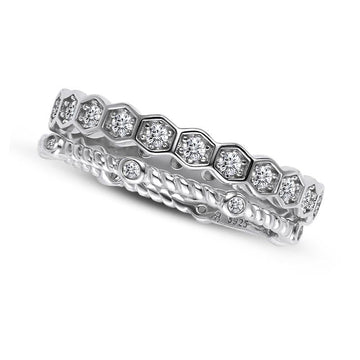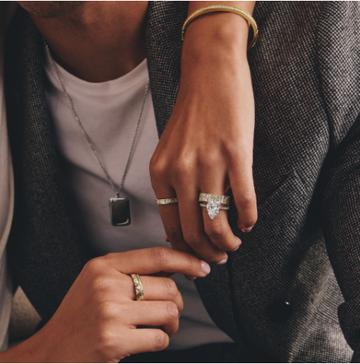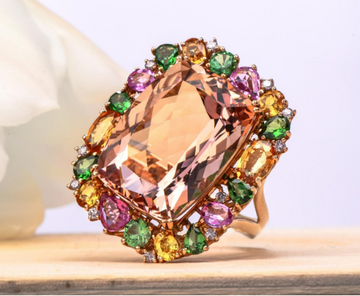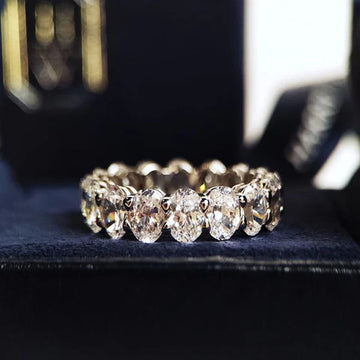Rings are often not just pieces of jewelry, but sentimental treasures, valuable investments, or symbols of important life events such as engagements, weddings, or personal achievements. Whether it's a sparkling diamond engagement ring or a cherished family heirloom, taking proper care of your rings can help them maintain their beauty and integrity for years to come. In this comprehensive guide, we’ll walk you through everything you need to know about caring for your rings, including cleaning and maintenance, resizing and repairs, and protection tips.
Cleaning and Maintenance of Your Rings?

Just like any other valuable possession, cleaning and maintenance are essential to keeping your rings looking as good as new. Regular care not only preserves their beauty but can also prevent the accumulation of dirt and grime that can cause long-term damage to the metals and gemstones.
How to Clean Different Types of Rings
Different rings require different cleaning methods depending on the material and the type of gemstones they contain. Here's a breakdown:
-
Diamond Rings
-
Cleaning: Diamonds are one of the hardest materials, but they can still accumulate oil and dirt from regular wear. The best way to clean a diamond ring is to use a solution of warm water and mild dish soap. Let the ring soak for 20-30 minutes, then gently scrub it with a soft-bristled toothbrush to remove any buildup. Avoid using harsh chemicals or abrasive materials, as these can dull the diamond’s sparkle.
-
Tip: Always make sure to rinse the ring thoroughly after cleaning and dry it with a soft cloth.
-
-
Gold Rings
-
Cleaning: Gold is relatively soft, so it requires gentler cleaning. Use a solution of warm water, mild soap, and a soft brush to clean the gold. Be sure to dry the ring with a microfiber cloth to avoid scratching the surface.
-
Tip: For tarnished gold, try using a gold polish cloth or a specialized gold cleaner.
-
-
Platinum Rings
-
Cleaning: Platinum rings can develop a patina over time, which many people find appealing. If you prefer the shiny look, use a platinum jewelry cleaner or a mild soap and water solution. Clean the ring gently with a soft cloth to maintain its luster.
-
Tip: Avoid using abrasive polishes on platinum, as they can scratch the metal.
-
-
Silver Rings
-
Cleaning: Silver can tarnish easily, so it’s essential to clean it regularly. To clean silver, use a solution of warm water and mild dish soap, and scrub it with a soft brush. For heavier tarnish, use a specialized silver polish cloth.
-
Tip: Store silver rings in a tarnish-resistant pouch to minimize exposure to air and moisture.
-
-
Gemstone Rings
-
Cleaning: Gemstone rings require special care. Soft gemstones like opals and pearls are more delicate and should be cleaned with a damp cloth. Harder gemstones like sapphires or rubies can be cleaned with the same solution used for diamonds. Always check the specific care instructions for the gemstone to avoid damaging it.
-
Tip: Never clean gemstone rings with ultrasonic cleaners, as the vibrations can crack or damage the stones.
-
Proper Storage to Keep Rings Safe
When you're not wearing your rings, proper storage is crucial to maintaining their condition. Storing your rings properly can prevent them from getting scratched, damaged, or tangled.
-
Ring Boxes: Always store your rings in a padded ring box to keep them protected from dust, dirt, and physical damage.
-
Separate Compartments: If you have multiple rings, ensure they are stored in separate compartments or pouches to prevent scratching. Avoid stacking rings together as the friction can cause them to lose their shine.
-
Avoid Humidity and Heat: Store rings in a dry, cool place, as exposure to humidity or heat can cause damage to both the metal and gemstones. If you're storing rings for an extended period, consider using anti-tarnish pouches for silver jewelry.
2. When to Get Rings Resized or Repaired
Rings, especially those worn daily like engagement and wedding rings, can experience wear and tear over time. Resizingand repairs are sometimes necessary to ensure that your ring continues to fit well and remains in top condition.
Signs That Your Ring Needs Resizing?
It's important to know when your ring might need resizing to ensure comfort and avoid losing it. Here are some signs that indicate it might be time to resize:
-
Difficulty Removing the Ring: If you find it increasingly difficult to remove your ring, especially at the end of the day, it could be a sign that the ring has become too tight.
-
Ring Feels Loose or Spins: If the ring moves around excessively on your finger or slides off easily, it's likely too loose. A loose ring can also be a safety concern, as it may slip off and get lost.
-
Finger Swelling or Shrinking: Changes in your finger size, due to weight changes, pregnancy, or even seasonal fluctuations, can affect the fit of your ring. If your finger has swelled, your ring may no longer fit comfortably, requiring resizing.
Common Repairs for Rings:
Rings can undergo various forms of damage over time. Here are the most common types of ring repairs and how they can be fixed:
-
Stones Falling Out: The prongs that hold stones in place can wear down over time, causing gemstones to fall out. Regular inspections can help prevent this, but if a stone is lost, it can often be replaced by a professional jeweler.
-
Damaged Bands: A cracked or bent ring band can result from impact or regular wear. In many cases, jewelers can repair the band by re-soldering it or reshaping it to restore its original form.
-
Scratches and Dents: Platinum and gold rings are prone to surface scratches and dents. Professional jewelers can buff out minor scratches or even re-plate rings to restore their appearance.
3. Protection Tips for Your Rings
To extend the life of your rings, protecting them from everyday wear and tear is essential. Here are some tips to prevent damage and ensure that your rings remain in excellent condition.
How to Avoid Scratching or Damaging Rings?
-
Avoid Contact with Harsh Chemicals: Household cleaning products, lotions, perfumes, and even hair products can tarnish or damage the metal and gemstones in your rings. Remove your rings before using any harsh chemicals or lotions.
-
Be Mindful of Physical Activities: Avoid wearing rings while engaging in physical activities like gardening, sports, or heavy lifting, as these can cause scratches or damage. Always remove your rings before swimming, exercising, or doing any activity that could cause them to get caught or damaged.
-
Take Rings Off for Certain Tasks: Remove your rings when cleaning, cooking, or doing any work that involves moisture or oils. This can help prevent build-up and preserve the shine of your jewelry.
When to Remove Rings?
-
Swimming and Water Activities: Water can affect both the metal and gemstones in your rings. Chlorine in pools, for example, can tarnish silver and damage other metals. Saltwater can cause metal to corrode, so it's best to remove your rings before swimming or engaging in water sports.
-
Exercising and Lifting Weights: Wearing rings during exercise can put unnecessary pressure on the ring and cause it to bend or scratch. Additionally, the metal can rub against gym equipment, leading to wear and tear.
-
Sleep and Relaxation: If you're prone to shifting or clenching your hands while sleeping, it's best to remove rings to prevent unintentional damage or pressure on the band.
Conclusion:
Proper care, maintenance, resizing, and protection of your rings are essential to ensure they stay beautiful and functional for many years. Regular cleaning, safe storage, and timely repairs can help preserve the integrity of your rings, while resizing ensures they fit comfortably. With these tips and practices, you can enjoy your rings—whether it's an engagement ring, a family heirloom, or a fashion statement—knowing they are well taken care of. Remember, a little attention to detail goes a long way in preserving the quality and beauty of your cherished jewelry.







